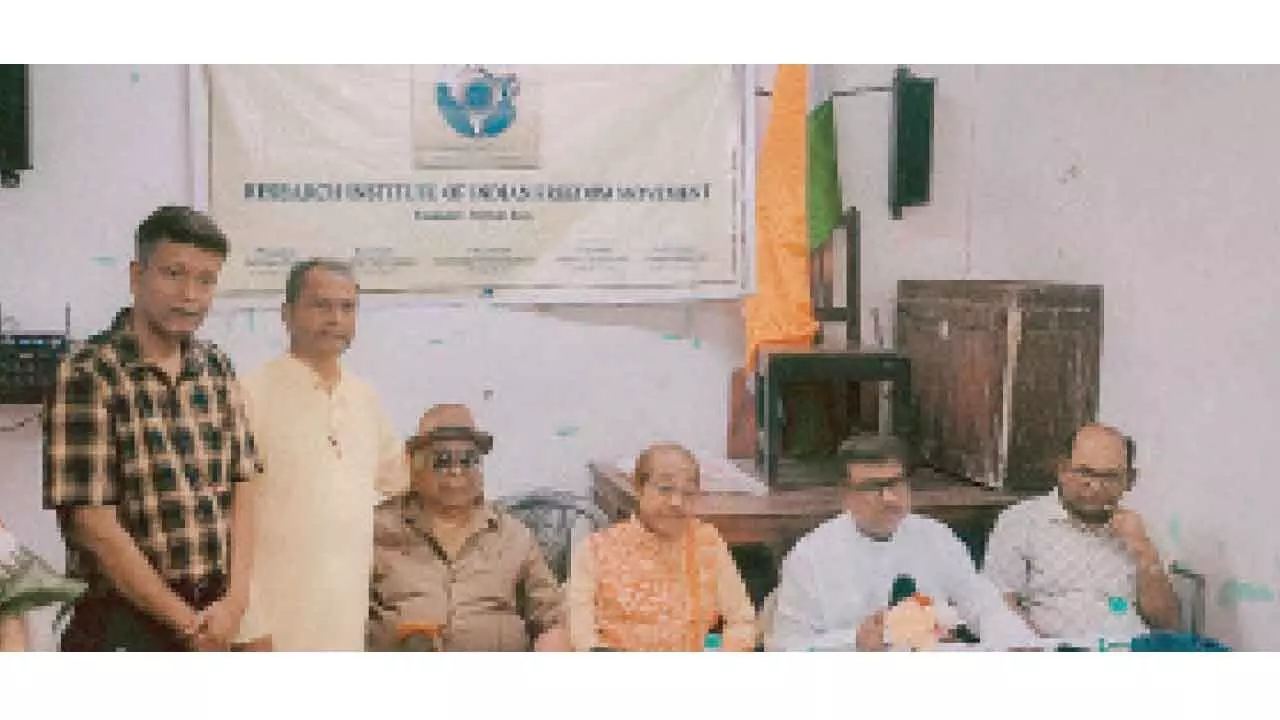Unearthing India’s Forgotten Heroes
Founded by Biplab Roy, RIIFM aims to provide an apolitical and factual account of the freedom movement, honoring unsung heroes through rigorous research and documentation
Unearthing India’s Forgotten Heroes

The newly established Research Institute of Indian Freedom Movement (RIIFM) has set out to revise the narrative of India's struggle for Independence by shedding light on overlooked contributions made by countless freedom fighters. Founded by Biplab Roy, the organization’s primary goal is to document the sacrifices and achievements of unsung heroes whose names have faded from historical records. Talking to Bizz Buzz, Biplab Roy said, “Our generation must know the true stories of those who fought valiantly but remain unrecognized. Through our research, we aim to identify these heroes and honour their legacies”
The organization’s mission is to provide an apolitical, factual recount of the Indian freedom movement. Roy’s vision for the institute centres on highlighting stories that conventional history books have either misrepresented or omitted altogether, he said.
This commitment was formally launched at the Bijoya Conference, held on October 29, at Kolkata’s 150-year-old Indian Association. The conference brought together scions of well-known freedom fighters alongside descendants of lesser-known revolutionaries. The gathering commemorated the contributions of revolutionary figures, including Shaheed Prafulla Chaki, Masterda Suryasen, Revolutionary Ullaskar Dutt, Deshbandhu Chittaranjan Das, and Byomkesh Chakraborty. Attendees included prominent family members and descendants of these freedom fighters, many of whom shared personal accounts of their ancestors' sacrifices.
Among the event's highlights, renowned singer Nupur Kazi, great-granddaughter of celebrated poet Kazi Nazrul Islam, performed the stirring song “Karar Oi Louhakpat,” adding a touch of gravitas to the proceedings. Centenarian freedom fighter Shri Haren Bagchi inaugurated the conference with a ceremonial lighting of the lamp, marking the organization’s formal commitment to its mission.
In his keynote address, Founder Biplab Roy underscored the institute’s objective of researching and reevaluating the history of the freedom struggle, focusing on impartiality and historical accuracy. “It is vital that we recognize the names and contributions of revolutionaries who have been excluded from the mainstream narratives,” he said, calling for a balanced and inclusive record of India’s path to independence.
The institute's President, Subrata Chaki, grandson of Shaheed Prafulla Chaki, offered unique insights into his ancestor’s life, sharing previously unknown accounts of his revolutionary activities. Subhendu Bandopadhyay, the organization’s Secretary, alongside Kaushik Dutta Gupta, nephew of Ullaskar Dutt, spoke passionately about the need to correct politically biased interpretations of historical events. “It is our duty as educated citizens to go beyond political agendas and focus solely on factual history. This is the sole purpose of our organization,” Dutta Gupta emphasized.
Dr Shubhro Chakrabartty, member of RIIFM also expressed his admiration for the institute’s goals: “This step is incredibly meaningful in honouring the sacrifices and achievements of unsung heroes whose names have faded from historical records. It can guide our youth towards the legacy of these martyrs, inspiring in them a deep appreciation and love for their motherland.” Researchers at the institute are diligently working to identify unsung heroes of India’s freedom struggle and trace their families. Recently, they uncovered the inspiring stories of two such figures.
The first is Khadgaballabh Das, born in 1912 in the village of Imadpatti, Jhanjharpur Block, Madhubani district, Bihar. Initially employed as a motor technician in the British Army and stationed in Burma, Das was moved by a strong sense of patriotism. He left the army to participate in the Quit India Movement in 1942 and express his fervour through patriotic literature. As a result, he was arrested and kept in Madhubani Jail for a few months. For his unique contributions to India’s independence and literature, he was awarded the prestigious Karnshree honour posthumously.
The second hero discovered was Hridoy Ranjan Chakrabartty, a freedom fighter from Sujatpur village near Masiahati, Thana - Manirampur District- Jassore, East Bengal (now Bangladesh). Born in 1874, Chakrabartty joined the protest, against the Banga-Bhanga movement in 1905 and the Swadeshi Movement in 1906, advocating for India’s self-reliance. His activism led to his imprisonment in the historic Old Dhaka Central Jail on Nazimuddin Road in Chawkbazar, Bangladesh. Later, he became a committed follower of Netaji Subhas Chandra Bose and participated in guerrilla resistance along the East Bengal border. His son, Satyanarayan Chakrabartty, joined him in the Quit India Movement of 1942 at just 12 years old. Today, his legacy lives on through his grandson, Dr. Shankar Kumar Chakrabartty, a retired banker and philanthropist in Uttarakhand, who continues to honour his family’s contributions to India’s freedom and upliftment. The Research Institute of Indian Freedom Movement plans to expand its network of researchers and historians across India, aiming to recover and document the narratives of those who contributed to India’s independence but remain uncelebrated. Through this initiative, the institute hopes to offer future generations a richer, more inclusive understanding of India’s freedom struggle.

